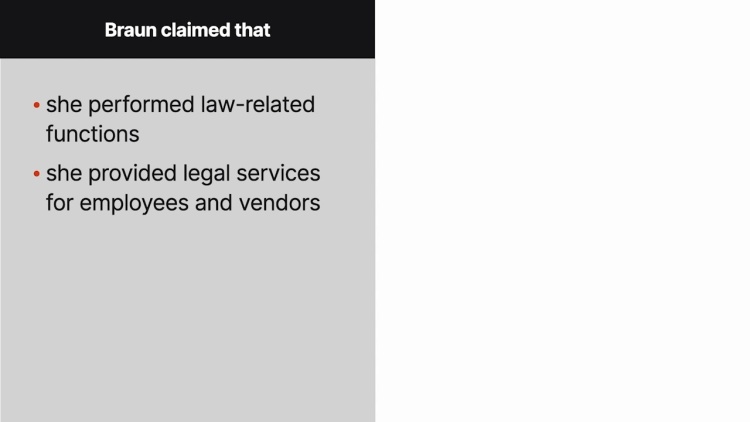In re Braun
North Carolina Supreme Court
352 N.C. 327, 531 S.E.2d 213 (2000)
- Written by Samantha Arena, JD
Facts
Nancy Braun (plaintiff), an attorney admitted in both New York and the District of Columbia, applied on December 5, 1996 for admission to the North Carolina Bar by comity. The North Carolina Board of Law Examiners (defendant) denied Braun’s application, finding that Braun failed to prove that she had been actively and substantially engaged in the practice of law for at least four out of the six years preceding her application, as required by Section .0502(3) of the Rules Governing Admission to Practice Law in the State of North Carolina. Between November 1991 and November 1996, Braun owned and operated Harvest Moon Café and Catering. Braun maintained that, in addition to operating the restaurant, she performed law-related activities for the cafe, including obtaining a business loan, resolving landlord disputes, and negotiating contracts, and provided other legal services for employees and vendors, such as traffic-court appearances. During this time, however, Braun did not operate a legal office separate from the restaurant, nor did she maintain billing records, advertise for services, or attend continuing legal education. The Board concluded that Braun displayed a lack of candor and provided misleading responses to questions in attempting to prove that her work at the restaurant constituted the active and substantial practice of law. The Superior Court of Wake County affirmed the Board’s decision.
Rule of Law
Issue
Holding and Reasoning (Freeman, J.)
What to do next…
Here's why 907,000 law students have relied on our case briefs:
- Written by law professors and practitioners, not other law students. 47,100 briefs, keyed to 996 casebooks. Top-notch customer support.
- The right amount of information, includes the facts, issues, rule of law, holding and reasoning, and any concurrences and dissents.
- Access in your classes, works on your mobile and tablet. Massive library of related video lessons and high quality multiple-choice questions.
- Easy to use, uniform format for every case brief. Written in plain English, not in legalese. Our briefs summarize and simplify; they don’t just repeat the court’s language.





